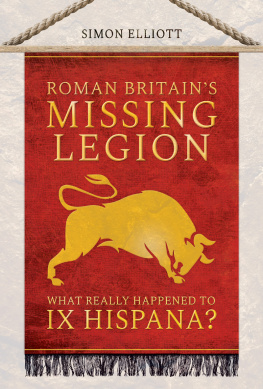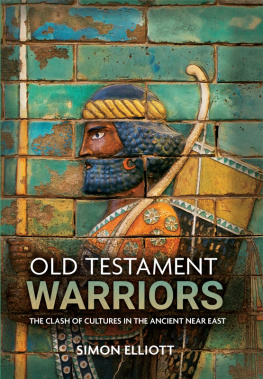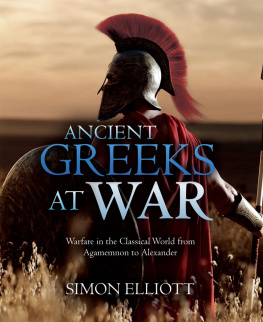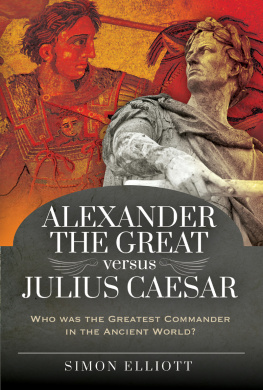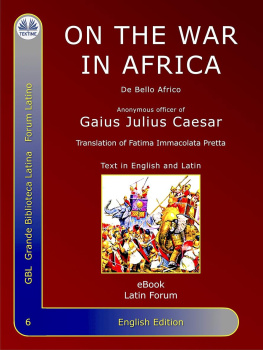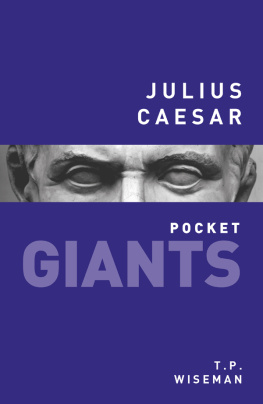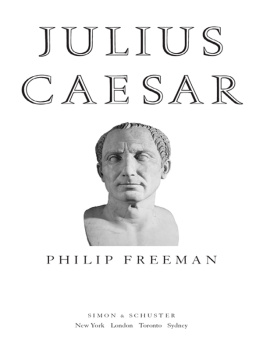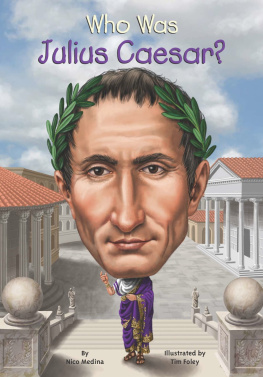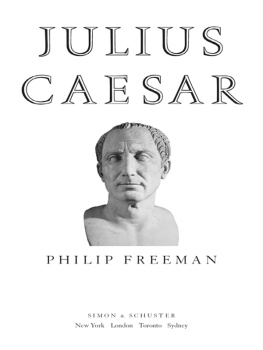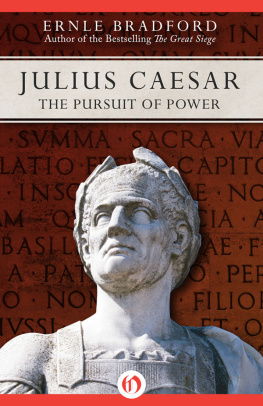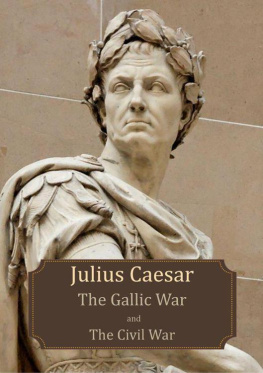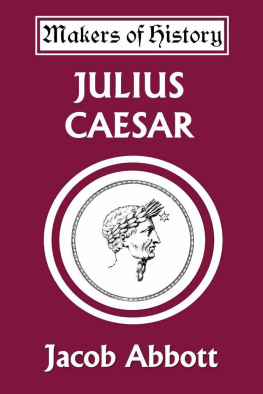Published in Great Britain and
the United States of America in 2019 by
CASEMATE PUBLISHERS
The Old Music Hall, 106108 Cowley Road, Oxford OX4 1JE, UK
1950 Lawrence Road, Havertown, PA 19083, USA
Casemate Publishers 2019
Hardback Edition: ISBN 978-1-61200-709-0
Digital Edition: ISBN 978-1-61200-710-6
Kindle Edition: ISBN 978-1-61200-710-6
All rights reserved. No part of this book may be reproduced or transmitted in any form or by any means, electronic or mechanical including photocopying, recording or by any information storage and retrieval system, without permission from the publisher in writing.
A CIP record for this book is available from the British Library
For a complete list of Casemate titles, please contact:
CASEMATE PUBLISHERS (UK)
Telephone (01865) 241249
Email:
www.casematepublishers.co.uk
CASEMATE PUBLISHERS (US)
Telephone (610) 853-9131
Fax (610) 853-9146
Email:
www.casematepublishers.com
INTRODUCTION
Gaius Julius Caesar is one of the greatest figures of world history. He was both the leading politician of his day and a supreme military leader. Caesar played a crucial role in expanding Roman territory to the size that would later emerge as the Empire under his great nephew, adopted son and heir, Augustus. Later, his dramatic assassination began the terminal spiral of events that brought the Roman Republic to an end and the Empire into being.
He is known to us today by a cognomen that has become synonymous with power and ambition ever since. Such is the resonance of the name Caesar with political and military virility that actual titles of monarchs are derived from it. Think of the Russian and Slavic Tsar, or German Kaiser. Of course his legacy spreads far wider than simple kingship nomenclature. Think of the global spread of Latin languages and the Catholic Church, or the impact of Roman law on modern legal systems. Caesar also reformed the calendar with his Julian system, the first in Roman history to comprise 365 days. For his efforts, the Senate then named the month of July after him after his death. Few mortals can claim such an honour.

A Roman gens , or clan, was an extended group of related families who shared the same nomen (the second personal name of a Roman citizen), could claim descent from a common ancestor, and often found common cause on the great issues of their time. In wider Roman aristocratic society ones gens was particularly important, especially in times of strife when members of a clan looked to each other for support.

Caesar was born on the 13th of July, 100 BC into the Julii clan. His family were senatorial level patricians, though they were of little renown. As a young man he owed his rapid rise along the cursus honorum aristocratic career path to the early death of his father when he was 16, and the conflict between the conservative pro-Senate optimates and reforming populares political factions in Rome. The former were championed by the strongman Lucius Cornelius Sulla, the latter by Caesars uncle-in-law Gaius Marius before his death in 86 BC. When Sulla was ascendant from the late 80s BC, Caesar was frowned upon and forced to serve abroad in the military to avoid his ire. He later negotiated a return to Rome with Sulla where he then began a legal career. Caesar next travelled to Rhodes to study philosophy, and it was on this trip where he was famously captured by Cilician pirates. Once freed through the payment of a ransom, he had his captors crucified. This was not a man to be messed with. He next fought troops of the last of the Hellenistic monarchs who had the audacity to stand up to the power of Rome in the east, Mithridates VI Eupator, the king of Pontus.
Caesar later aligned himself with the next great Roman warlord, Gnaeus Pompey. This aided his progression along the cursus honorum and by 61 BC he was the governor of the key province of Hispania Ulterior (Further Spain). In 59 BC he became consul for the first time, later facilitating the formation of the Triumvirate alliance to control power in Rome alongside Pompey and his fabulously wealthy rival Marcus Licinius Crassus. This lifted Caesar to the top tier of Roman politics. He was then awarded the governorship of Gaul, conquering any lands initially out of Roman control between 58 and 50 BC. This included two incursions to Britain in 55 and 54 BC, the first time these islands enter the historical record.
Caesars military success in Gaul, while popular among the military and lower classes in Rome, caused friction with his two fellow triumvirs. The upstart from the Julii was beginning to steal their thunder. Things were patched up at the conference at Luca in 56 BC, but Crassuss untimely death in 53 BC while campaigning against the Parthians started a sequence of events that saw Caesar and Pompey eventually locked into a life or death struggle. The Roman aristocracy, despite Caesars successes abroad, increasingly saw him as an interloper threatening their traditional power. They elevated Pompey to be their champion. Caesar famously led his troops across the Rubicon river in 49 BC on his way to challenge Pompey in Rome. The latter then fled to Greece where Caesar finally defeated him at the crucial battle of Pharsalus in 48 BC. Pompey was beheaded in Egypt soon afterwards, and within two years Caesar was the sole master of the Roman world. In this period he became entangled in the politics of the Ptolemaic court in Egypt. This included his infamous affair with the queen there, Cleopatra. Now dictator for life, such events set him aloof from his noble peers in Rome with whom friction continued to grow, despite Caesar filling the Senate with allies and courting the adulation of the masses. Matters finally came to a head with his assassination in the Senate House aged 55 on the Ides of March in 44 BC at the hands of his political opponents. This event martyred him in the eyes of contemporaries, starting a final vicious round of civil wars that destroyed the Republic and created the Empire.
Given Caesars prominence as one of the most influential figures in world history, we are fortunate that sources proliferate about his adult life. Modern ones are too numerous to mention, but in terms of primary sources the key ones include Caesar himself in his own The Conquest of Gaul and Civil War , his contemporaries Cicero in his letters and various works, Sallust in his Catilines Conspiracy , Caesars legate Aulus Hirtius who added a chapter to the Gallic Wars and may have edited On the African War and On the Spanish War (both narrating Caesars activities there), Velleius and his late 1st century BC/ early 1st century AD Roman History , Plutarch with his early 2nd century AD Lives , Suetonius with his Twelve Caesars written in the same period, Appian with his Roman History in the mid-2nd century AD, Cassius Dio with his early 3rd century AD Roman History , and Jordanes in the 6th century AD with his Romana . The later 1st century BC/early 1st century AD historian Livy also wrote about Caesar, but his works do not survive other than as excerpts. It should be noted here the paucity of primary sources regarding Caesars early family history and childhood.







